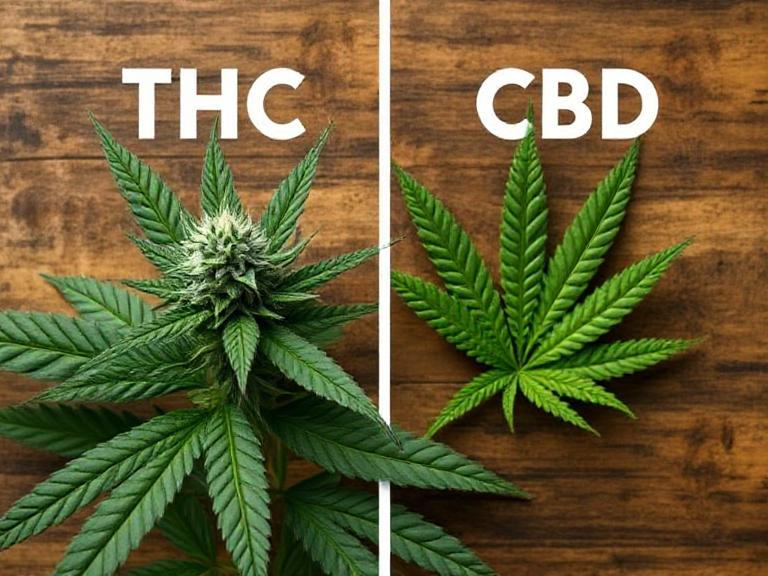
A Beginner’s Guide to THC and CBD: What’s the Difference?
by Dexter Cann
·
Table of Contents
Cannabis has taken the world by storm in recent years, with increasing legalization and growing awareness of its potential benefits. Whether you’re a seasoned enthusiast or just starting out, understanding the difference between THC and CBD is essential. These two primary compounds found in cannabis have distinct effects, benefits, and uses. This guide will break down the key differences, how they work in the body, and which one may be right for you.
What Are THC and CBD?
THC (tetrahydrocannabinol) and CBD (cannabidiol) are both cannabinoids, chemical compounds found in the cannabis plant. While they share a similar molecular structure, their effects on the body and mind are quite different.
-
THC is the psychoactive compound in cannabis responsible for producing the “high” sensation.
-
CBD is non-psychoactive, meaning it won’t make you feel high, but it does offer a variety of therapeutic benefits.
How THC and CBD Work in the Body
Both THC and CBD interact with the endocannabinoid system (ECS), a complex network of receptors found throughout the body. The ECS plays a crucial role in regulating mood, pain, sleep, appetite, and immune function.
-
THC primarily binds to CB1 receptors in the brain, which is why it produces psychoactive effects.
-
CBD interacts indirectly with CB1 and CB2 receptors, influencing the ECS without causing a high.
The Effects of THC vs. CBD
THC Effects:
-
Euphoria and relaxation
-
Increased appetite (the “munchies”)
-
Altered sensory perception
-
Possible paranoia or anxiety in high doses
-
Pain relief and muscle relaxation
CBD Effects:
-
Reduced anxiety and stress
-
Anti-inflammatory benefits
-
Pain relief without intoxication
-
Improved sleep quality
-
Potential neuroprotective properties
Medical Benefits of THC and CBD
Both cannabinoids have unique medicinal properties that make them valuable for various conditions.
THC’s Medical Benefits
-
Chronic Pain Relief: Used to manage pain from conditions like arthritis, fibromyalgia, and multiple sclerosis.
-
Nausea and Appetite Stimulation: Helps chemotherapy patients reduce nausea and increase appetite.
-
Muscle Spasticity Relief: Beneficial for people with multiple sclerosis and spinal cord injuries.
-
Glaucoma Treatment: Reduces intraocular pressure in glaucoma patients.
CBD’s Medical Benefits
-
Anxiety and Depression Management: Helps reduce symptoms of anxiety, PTSD, and depression.
-
Seizure Reduction: Approved by the FDA in the drug Epidiolex to treat epilepsy.
-
Anti-Inflammatory and Pain Relief: Used for arthritis, migraines, and inflammatory conditions.
-
Sleep Improvement: Helps people with insomnia and sleep disorders.
Legal Status of THC and CBD
The legal status of THC and CBD varies by location:
-
THC is still classified as a controlled substance in many regions, though it is legal for medical or recreational use in some states and countries.
-
CBD is legal in many places, especially when derived from hemp (containing less than 0.3% THC in the U.S.). However, regulations can vary, so it’s essential to check local laws.
Methods of Consumption
THC and CBD can be consumed in various ways, each offering different onset times and durations.
Ways to Consume THC
-
Smoking/Vaping – Immediate effects, lasting 1-3 hours.
-
Edibles – Effects take 30 minutes to 2 hours but last longer (4-8 hours).
-
Tinctures/Oils – Taken under the tongue for a faster onset (15-45 minutes).
-
Topicals – Applied to the skin for localized pain relief without psychoactive effects.
Ways to Consume CBD
-
Oils and Tinctures – Most common and effective method.
-
Capsules and Edibles – Easy for consistent dosing.
-
Topicals – Ideal for pain relief and skincare.
-
Vaping – Provides fast-acting relief.
Side Effects of THC and CBD
THC Side Effects
-
Dry mouth and red eyes
-
Increased heart rate
-
Short-term memory impairment
-
Drowsiness or fatigue
-
Potential anxiety or paranoia
CBD Side Effects
-
Dry mouth
-
Changes in appetite
-
Fatigue or drowsiness
-
Potential interactions with medications
Which One Should You Choose?
Choosing between THC and CBD depends on your needs and preferences.
-
For pain relief: Both THC and CBD can help, but THC is stronger for severe pain.
-
For anxiety or stress relief: CBD is the better option, as THC may increase anxiety in some users.
-
For sleep improvement: CBD can help with relaxation, while THC can induce drowsiness.
-
For recreational use: THC is the go-to option for those seeking a euphoric high.
Storing Your THC and CBD Products Properly
To maintain the potency and freshness of your cannabis products, proper storage is essential. Factors like light, air, and moisture can degrade cannabinoids over time.
Best Storage Practices:
-
Use a Stash Box: A high-quality stash box, like the ones from Cubbi, keeps your cannabis fresh, discreet, and organized.
-
Keep it in a Cool, Dark Place: Store your products away from direct sunlight and heat.
-
Use Airtight Containers: Prevents exposure to air and moisture that can degrade quality.
-
Label Your Products: Keep track of strains, potency, and expiration dates.
Why You Need a Cubbi Stash Box
At Cubbi, we know that proper cannabis storage is just as important as the quality of the product itself. Our stash boxes are designed to keep your THC and CBD products safe, discreet, and fresh for longer. With stylish designs and secure locks, a Cubbi stash box is a must-have for any cannabis enthusiast.
Ready to Upgrade Your Storage?
Don’t let poor storage ruin your cannabis experience. Check out Cubbi’s collection of stash boxes today and keep your THC and CBD products fresh, safe, and discreet!